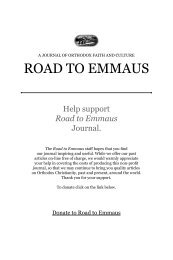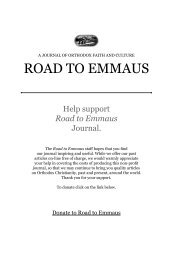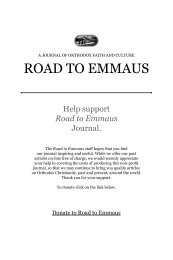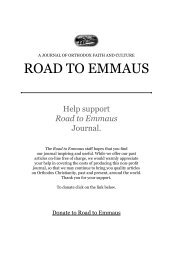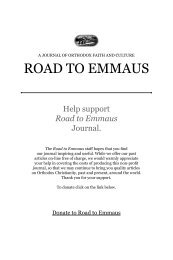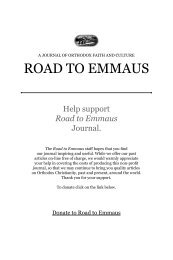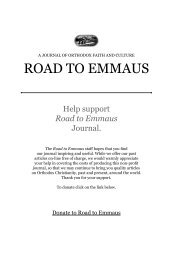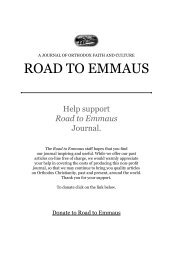RTE No 20 Interior - Road to Emmaus Journal
RTE No 20 Interior - Road to Emmaus Journal
RTE No 20 Interior - Road to Emmaus Journal
Create successful ePaper yourself
Turn your PDF publications into a flip-book with our unique Google optimized e-Paper software.
<strong>Road</strong> <strong>to</strong> <strong>Emmaus</strong> Vol. VI, <strong>No</strong>. 2 (#21)FROM JAINISM TO ORTHODOXYSYMEON: There is a sense of the soul, but whether a person retains an individualconsciousness of himself, I’m not sure. It is more a philosophy ofabsorption in<strong>to</strong> the divine. Our Abrahamic monotheism is unique <strong>to</strong>Christianity and Judaism. It seems that the actual theology of Jain prayerwas originally a little more like our veneration of saints, but in practice ithas devolved in<strong>to</strong> worship.ELESA: Perhaps because Jainism has been influenced by Hindu polytheism.<strong>RTE</strong>: Do Jains worship the idols themselves, or do the idols represent thetwenty-four prophets, like Catholic statues represent saints? And if so, whoare the guides interceding <strong>to</strong> for you?ELESA: They would intercede <strong>to</strong> that amorphous higher consciousness. TheTirthankaras were earthly guides who became enlightened, and Jains believethat they can also help us become enlightened, so that we can escape from thecycle of reincarnation. Although we understand that they are only guides,some Jains have deified them, so in effect, the guides have become idols orgods. It’s all very unclear and this is why there was eventually a schism inJainism between those who worshiped the guides and those who didn’t.<strong>RTE</strong>: Growing up, did you ever have an intimation of there being a personalGod?ELESA: I have always believed in a personal God. Although I practiced idolatry,I never quite believed in it. When I was young, I consciously prayed <strong>to</strong>what I thought of as a personal God and I felt that He heard me.Worshipping the idols just didn’t make sense <strong>to</strong> me.<strong>RTE</strong>: I found the following paragraph in a description of Jainism, and wonderedif it coincides with what you practiced? It puts a rather different faceon our western conception of idolatry, although you’ve made it clear thatJainism and Hinduism are different:“Hence we may understand Jain image worship as being of a meditativenature; the Jina is seen merely as an ideal, a certain mode of thesoul, a state attainable by all embodied beings. Through personificationof that ideal state in s<strong>to</strong>ne, the Jain creates a meditative support, as itwere, a reminder of his lofty goal and the possibility of its attainment.”ELESA: That sounds right from a scriptural point of view, but actual practicefrequently differs.<strong>RTE</strong>: Whether Jains worship the Tirthankaras or pray <strong>to</strong> them as intercessors,do they pray for help with specific needs, or just for a general blessing?ELESA: You can pray for a general blessing, but you can also pray for tangiblethings. Often fruits and flowers are offered, or special sweets. You takeyour offering <strong>to</strong> the temple, present it, and then you sometimes take it backand eat it. As you eat, you take in the blessing.SYMEON: Also, the prayers are not what we think of as prayers. They aren’tdirected <strong>to</strong>wards any god or even <strong>to</strong>wards the prophets. They aren’t intercessorsin that way.<strong>RTE</strong>: Can you give us an example of a Jain prayer?ELESA: The prayer that I grew up saying as a child is a verbal acknowledgemen<strong>to</strong>f respect for the prophets, my parents, elders, friends, and teachers.It is as common as the “Our Father” among Christians, but we might say itseveral times a day: on arising, before sleep, before eating, before work,before taking an exam…SYMEON: There is a special temple ritual, as well.ELESA: This ritual is only done when you’ve purified yourself, not only bybathing, but by saying certain prayers so that you can enter the sanctuary. Youalso cover your nose and mouth so that you don’t breathe on the idols anddon’t accidentally kill any living organisms by breathing them in. Then youoffer fruit and flowers and ritually dress the idols. There are also little idols athome, and you light a small vigil lamp in front of them after you’ve bathed.<strong>RTE</strong>: The prayer you mentioned above seems <strong>to</strong> have more of an ethical aspectthan worship or supplication as we Christians think of prayer. Could Jainismbe compared <strong>to</strong> Confucianism as a kind of ethical philosophy that describeshow you live righteously on earth, but isn’t oriented <strong>to</strong>wards worship, per se?ELESA: Yes, the idea of reverence for your ances<strong>to</strong>rs is common <strong>to</strong> bothConfucianism and Jainism, but otherwise, we are much closer <strong>to</strong> Buddhism.Lord Mahavira is the twenty-fourth Jain prophet, and his coming was pre-1213



